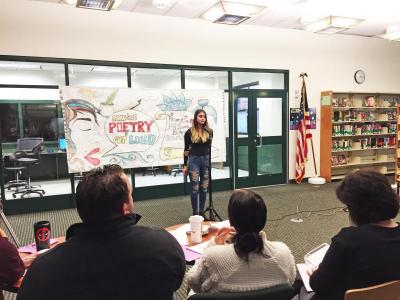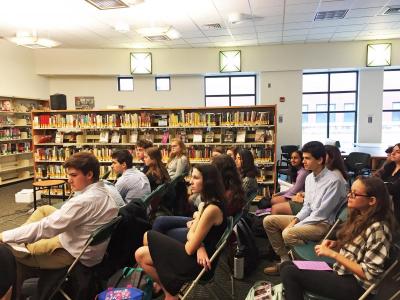High school students recite Poetry Out Loud for competition
December 18 may have seemed like a regular day at Dartmouth High School to most of the students.
But for the twenty students who gathered with friends in the media center at 7:40 a.m., it started off with a bang: The school held its annual “Poetry Out Loud” competition, in which students recited two poems they had memorized in performances in front of their peers.
Competitors were chosen for the event based on recitations held in English classes in the school.
During two rounds, in which each student recited one poem, four judges — all teachers and staff at the high school — marked the students on their performances.
Criteria such as physical presence, voice and articulation, and dramatic appropriateness as well as evidence of understanding were all taken into account in the scoring, with accuracy counting for a small part of the score as well.
“Students are judged on their performance, their interpretation of the poem, their inflection,” explained lead teacher in the English Department Will Higgins. “The biggest part of it really is demonstrating that they understand the poem itself.”
In a speech before announcing the winners, Higgins called the event “really impressive.”
“We had eight contestants last year, and we have twenty this year,” he said to the room. “Just the fact that you’re brave enough I think to take this on is pretty remarkable. I don’t think many people can do that.”
Higgins said afterwards that he was happy with this year’s competition. “We were surprised at how much interest there was, and enthusiasm coming into the next level this year,” he said. “It was impressive.”
Even more impressive, he said, was the fact that for the first round, none of the competitors needed a prompt. “Everybody went through the entire first round without a mistake or a prompt,” he said.
The first, second and third place winners received Amazon gift cards of $25, $20, and $15.
First place winner Isabella Rapoza recited two poems that she had memorized for a class last year. “I think that was an advantage for me, and I’m very happy that I decided to use the same two,” she said.
“The first poem that I did, [W. S. Merwin’s]‘Good People,’ it’s a lot about how there aren’t really good people in the world, because what even is a good person,” she said.
The sophomore added that she was “very excited” to move on to the Cape Cod Regional Poetry Out Loud competition in February.
Second place winner Alexis Arruda memorized her second poem on Monday, just 48 hours before the competition.
“I didn’t know which one to choose, and I read ‘What Women are Made of’ [by Bianca Lynne Spriggs], and I immediately knew that it was a poem that I was going to do,” she said.
This year there was a tie for third place, between junior Miguel Pereira and senior Makena Wolfe. The two will each receive a gift card.
“My first poem [Ted Kooser’s ‘Abandoned Farm House’], it really spoke to me because it’s about the stories behind where you are and how you change what you do,” said Pereira, adding that he chose his second poem, ‘Mowing’ by Robert Frost, because it is about the value of hard work.
Wolfe came to the competition last year. “My first one, ‘War Ballad’ by Stanley Moss, it’s very dark,” she said, adding that she enjoys the physicality of the performance.
“In Poetry Out Loud, it’s not just that you say the words,” she said. “You have to feel them, you have to show you know what the poet is trying to get across.”
She noted that this year her fellow competitors seemed “much better” than last year. “I’m impressed,” she said with a smile. “A lot of the people were really good!”
Higgins noted that the size of the event more than doubled this year due in part to the fact that enrollment in A.P. English classes jumped.
Plus, he said, “Students are getting more comfortable with the idea of reciting poetry in front of people.”
“I think a lot of them attended it last year, and enjoyed watching their peers do it,” he added. “In general it’s kind of loosened people up.”

















